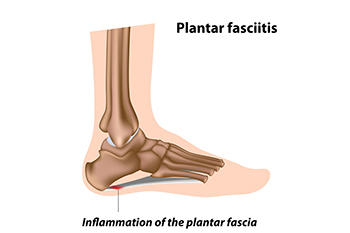Middlefield (860) 349-8500
Wallingford (203) 294-4977
Middlefield (860) 349-8500
Wallingford (203) 294-4977

Plantar fasciitis is inflammation of the plantar fascia, the band of fibrous tissue that runs the length of the bottom of the foot to the heel bone. This condition typically develops from over-stretching of that area, and can result in heel and arch pain and heel spurs. Excessive stretching of the plantar fascia can happen for numerous reasons, including flat feet, a sudden increase in physical activity, high body weight and its pressure on the foot, and footwear that is ill fitting. Pain with plantar fasciitis is often its worst first thing after arising from sleep and can diminish a bit as the day wears on. Treatments might be orthotics to reduce over-pronation, cushioning the heel to absorb shock, wearing supportive shoes that accommodate the foot well, losing weight, stretching exercises, and night splints. Since it is vital to determine the cause of plantar fasciitis to treat it properly, it is suggested that a podiatrist be consulted for evaluation.
Plantar fasciitis is a common foot condition that is often caused by a strain injury. If you are experiencing heel pain or symptoms of plantar fasciitis, contact Dr. Gordon Fosdick from Affiliated Foot Care Center. Our doctor can provide the care you need to keep you pain-free and on your feet.
What Is Plantar Fasciitis?
Plantar fasciitis is one of the most common causes of heel pain. The plantar fascia is a ligament that connects your heel to the front of your foot. When this ligament becomes inflamed, plantar fasciitis is the result. If you have plantar fasciitis you will have a stabbing pain that usually occurs with your first steps in the morning. As the day progresses and you walk around more, this pain will start to disappear, but it will return after long periods of standing or sitting.
What Causes Plantar Fasciitis?
There are some risk factors that may make you more likely to develop plantar fasciitis compared to others. The condition most commonly affects adults between the ages of 40 and 60. It also tends to affect people who are obese because the extra pounds result in extra stress being placed on the plantar fascia.
Prevention
There are a variety of treatment options available for plantar fasciitis along with the pain that accompanies it. Additionally, physical therapy is a very important component in the treatment process. It is important that you meet with your podiatrist to determine which treatment option is best for you.
If you have any questions, please feel free to contact our offices located in Middlefield and Wallingford, CT . We offer the newest diagnostic and treatment technologies for all your foot care needs.